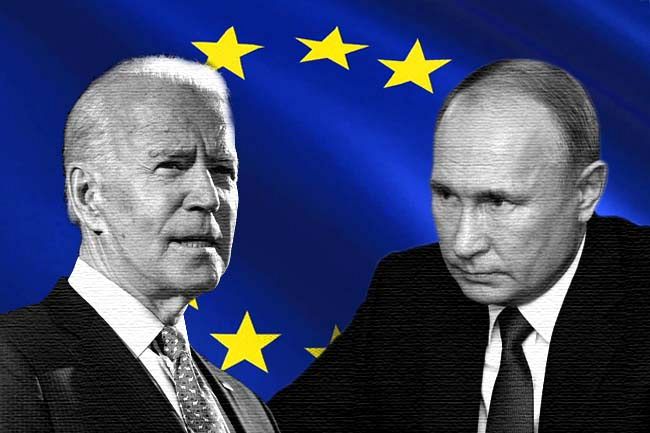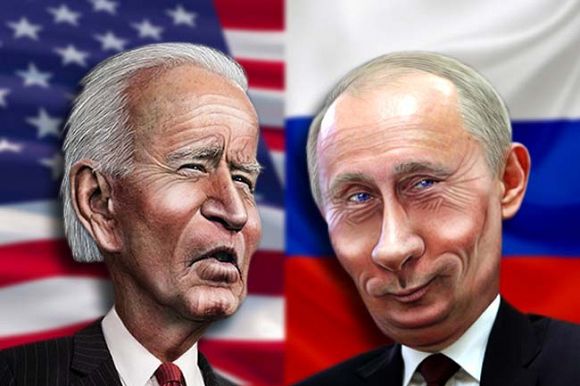Amid tensions between Russia and Ukraine, a display of unity is being achieved between European countries and the U.S., writes Dr Lee Duffield.
CLUTTERING THE NEWS AGENDA with COVID-19 may be a necessary part of survival but can distract from other need-to-know topics — like the fast drift towards war in Central Europe.
Australian news media at the end of January provided updates from news agencies about Russian pressure on Ukraine, official warnings to Australians to get out and not go there, and a few fragments about U.S. President Joe Biden mobilising some troops.
It could be seen as a probable war where the Russians would gain territory including full land access to the Crimea, annexed to Russia by force in 2014 — “a quarrel in a faraway country, between people of whom we know nothing”.
But a full-scale invasion, that might involve seizure of the national capital Kyiv and imposition of a Quisling government, more certainly means a cataclysm that will rebound for decades.
An analogy can be found with the second Gulf War in 2003, where the invading head of state, George W Bush of the United States, was notoriously dim and arguably as capricious as Russia’s President Vladimir Putin in 2022. The disastrous outcomes of his callous and colossal error in Iraq continue to reverberate.
A scenario with Russian forces positioning to invade Ukraine and the Western alliance, NATO, putting ships, air and also ground forces into the immediate region was highly dangerous for Europe and for the future of humanity.
The following is precise of the situation produced by the specialist European news service, Politico, on 25 January, which fills in some gaps on what is happening in the Ukrainian theatre.
It signalled the kinds of developments for unwary and COVID-soaked observers to begin to watch, very closely. The world has been there before, as in 2003 with Iraq, or 1939, with the German Nazis wanting to “get back” lands occupied by people of their own “race” — much the same as Putin and ethnic Russians in Ukraine.
This despatch, ‘Ukraine Latest’, from Jakob Hanke Vela and Suzanne Lynch in Politico, tells about both the high-level seriousness of government-to-government activity underway and an interpretation coming from the Western European side — at this stage not giving way to fright:
U.S. PREPARES FOR WAR WHILE EU SEEKS TO DE-ESCALATE: After another day of talks between EU countries and their U.S. allies seeking to maintain a joint front on Russia, there was one key message: It’s all about “European unity and transatlantic unity,” as Spain’s Foreign Minister José Manuel Albares told Playbook.
“There was a huge display of unity amongst Europeans but also Europeans together with the Americans,” his Dutch counterpart Wopke Hoekstra said.
The same message was sent out in readouts after U.S. President Joe Biden overnight videocalled the leaders of the UK, France, Germany, Poland and Italy, and the presidents of the European Council and Commission, from the White House Situation Room.
But from the EU’s and Washington’s actions, if not from their words, it’s becoming clear that both sides are deviating in their assessment of how imminent a Russian attack on Ukraine is.
Boots on: The Pentagon overnight put 8,500 troops on “heightened alert” to deploy to Eastern Europe in case Russia attacks, following an order for the evacuation of the families of embassy staff in Ukraine.
EU staying put: In contrast, EU countries have decided not to evacuate their embassies for the moment, with ministers and the EU’s foreign affairs chief Josep Borrell stressing they didn’t see imminent danger. “We are not going to do the same thing because we don’t know any specific reasons,” Borrell said Monday.
No self-fulfilling prophesies: EU ministers and advisers also insisted they still believed a diplomatic solution was possible. “In a crisis situation, everything can evolve very quickly so we must be careful not to write the end of the scenario even before other steps have been taken because you must obviously avoid the self-fulfilling character of the crisis,” said a French Elysée source.
Focus on economic risks: European foreign ministers at their meeting on Monday also pointed to the risk that sky-high energy prices, inflation and the tough economic situation in Ukraine could lead to a revolt rather than a military coup — but ultimately with the same outcome of a pro-Russian government taking over in Kyiv. Ministers insisted the Commission’s aid package of €1.2 billion in the form of an emergency financial assistance package and €120 million in additional grants was therefore crucial.
Dr Lee Duffield is a former ABC foreign correspondent, political journalist and academic.
Related Articles
- MH17: Re-evaluating the tragedy after the ceasefire
- What is the truth about Ukraine and MH17?
- Ukraine presidential elections and activism through art
 This work is licensed under a Creative Commons Attribution-NonCommercial-NoDerivs 3.0 Australia License
This work is licensed under a Creative Commons Attribution-NonCommercial-NoDerivs 3.0 Australia License
Support independent journalism Subscribe to IA.














